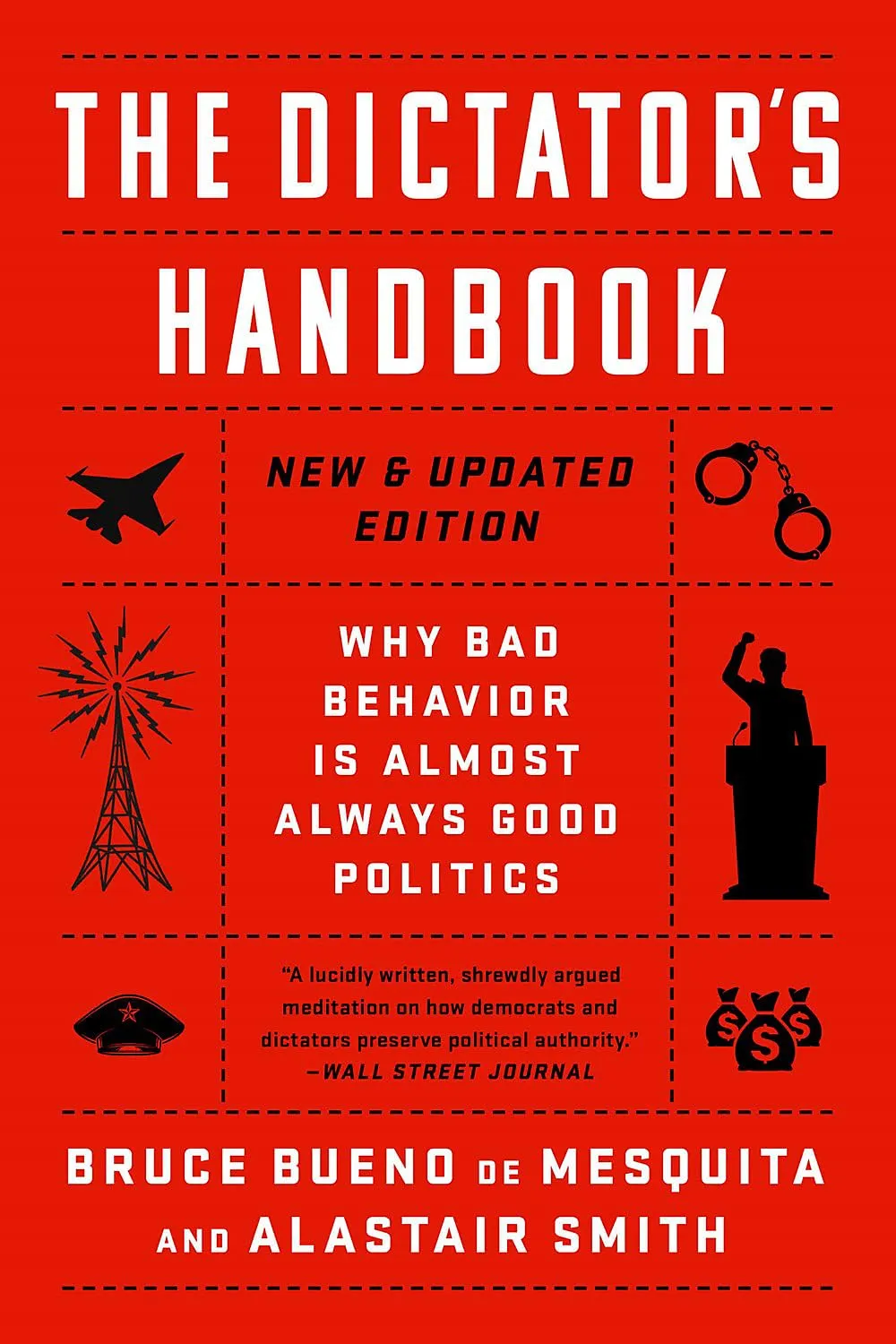Explores the underlying mechanics of political power and analyzes it with a framework that focuses on the number of people necessary to ascend to and maintain power. It argues that the strategies for staying in power are surprisingly similar across different systems of governance, emphasizing the importance of control over key resources and the support of essential backers. The book uses a wide array of historical and contemporary examples to illustrate its points, making complex political theories accessible and engaging. This insightful analysis challenges conventional wisdom about democracy and dictatorship, offering a new perspective on the motivations behind political actions.

"The Dictator's Handbook" offers an insightful analysis of how incentive systems in organizations – from politics to businesses and associations – often promote selfish and corrupt behavior. The authors, renowned political scientists, impressively elaborate their "Selectorate Theory" with this well-written and excellently structured book.
This book is more than a theoretical treatise; it provides concrete approaches for evaluating and improving states and organizations. It challenges readers to move beyond conventional views and understand the often-hidden motivations behind political decisions. This makes the book an essential read for anyone interested in the complexity of leadership behavior and its effects on society. The book covers a wide range of topics such as revolution, foreign aid, war, bailouts, and taxes, offering concrete recommendations for action – for politics, as well as for private organizations like businesses and clubs.
At its core is the idea that the size and composition of relevant groups in political systems and organizations are the critical factors for leaders' behavior. The authors identify three main groups: the first and largest group, the nominal selectorate, includes everyone who theoretically could decide on the leader. Its size determines how easily members of the other groups can be replaced. The second group, which actually contributes to the decision, is known as the real selectorate. The third and most crucial group is the essential coalition, i.e., those individuals indispensable for the leader's acquisition and maintenance of power.
In a democracy, for example, this would include all voters (nominal), the citizens who actually vote (real), and those whose votes have led to the leader's election (essential). In autocracies, however, in the case of sham elections like in the Soviet Union, it could include all citizens (nominal), members of the political committee who can vote within the party (real), and the actual decision-makers and generals (essential).
I found it very interesting to see how crucial the sizes of these groups relative to each other are and how well they can be used to evaluate a political system. The sizes of the groups directly influence which strategies are most advantageous for a leader.
In systems with few individuals in the essential coalition, the leader can easily provide direct benefits like money and privileges to them. However, if the essential coalition is large, as in democracies, direct benefits for all members would be too expensive. Therefore, it makes more sense in these cases to invest in public goods to secure the support of the essential coalition. Thus, the optimal course of action in democracies aligns much more closely with the public good.
A large essential coalition thus leads to socially desired and thereby relatively stable institutions. However, this often comes at the cost of the leader, as the need to satisfy a broader base limits the scope for individual exercise of power and increases interchangeability. I find these conclusions fascinating because they explain many political realities.
Based on this strong theoretical foundation, the book's core message follows: There are rules for dictators that significantly determine their behavior. These are based on the fact that all leaders in political systems aim to gain and maintain power. I find this plausible since even leaders motivated by altruism must submit to systemic pressures not to be replaced by more power-oriented rivals.
This results in specific strategies for maintaining power: The essential coalition should be as small as possible because fewer people need to be satisfied. At the same time, the nominal selectorate should be as large as possible to easily replace uncooperative members of the essential coalition. Control over financial flows is vital: Leaders must sufficiently reward their closest allies to secure loyalty. However, they must also not provide them with so many resources that they become independent and consider a coup.
Especially in small essential coalitions, it is therefore necessary to prioritize direct benefits for the coalition over spending money on public goods. In short, the financial tactic – balancing private benefits for the coalition, public goods for the general public, and available capital for the leader – is crucial for the power structure and maintenance in political systems.
Whether a revolution breaks out strongly depends on the economic conditions of the population: The likelihood is significantly lower when people are extremely poor and uneducated or particularly wealthy and satisfied. In the former case, mere survival is more important than political participation; in the latter, the population simply has no reason for a revolution.
However, whether the revolution is successful depends on something else: It can only succeed if the essential coalition withdraws its support for the leader. This often happens when a challenger promises the coalition greater benefits or when the leader wants to replace certain favorites during unrest but does not present them with a fait accompli, giving them room and time for a countermove.
I highly recommend "The Dictator's Handbook" – it's a very well-written book with highly exciting content. The presented framework offers a good opportunity to evaluate and analyze systems. Of course, a model never reflects 100% of reality, but in my opinion, it's very informative and practical. I will certainly incorporate this pattern of thinking into my own political considerations. Readers who complete the book will learn much more fascinating things, including why most foreign aid is counterproductive, democracies prefer autocracies over other democracies, and how to make FIFA less corrupt.
For series fans, there is also a Netflix series based on the book: "How to Become a Tyrant," which I personally did not find very thrilling. Much more interesting are the explanatory videos based on the book by the well-known YouTube channel CGP Grey.
